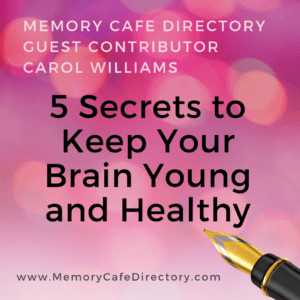Memory Cafe Directory posts and/or links to retailers can be advertising, sponsored, or affiliate links. We may earn a small commission from them. Thank you.
Guest Contributor: Carol Williams
The brain is one of the unique parts of the body. It gives life to your thoughts, emotions, and helps coordinate movement and activities like typing and navigating an obstacle while driving.
In addition, it serves as the reserve that stores our childhood memory and supplies necessary information in case you need it during a test or exam.
However, taking these attributes for granted is easy as the brain experiences significant changes as it grows. These changes are normal with age and could reduce your cognitive ability significantly.
However, the good news is that you can do many things to keep your brain healthy and reduce the chances of developing health issues like dementia or Alzheimer’s.
1Exercise More
One of the simple and most important things to do to keep your brain in top gear is exercise. Even research has it that an inactive lifestyle sets the stage for dementia, while an active lifestyle can help fight it.
Interestingly, exercise does not have to be about getting a membership at the gym or working out like a maniac. You can take a walk for five minutes, and it will make a lot of difference. Exercise is good therapy for stress management and immune function. It also helps the brain by reducing inflammation and supporting the growth of neural cells.
These benefits are possible because exercise increases blood flow, which fights some natural declines in brain health due to aging. If you are finding it difficult to keep your energy levels up, Green Roads CBD is a good substance that can help.
2Learn a New Skill
Keeping your brain young and healthy requires a lot of commitment, but it will reward you if you are faithful. The brain loves and feeds on challenges, and what other way to accomplish it than introduce fresh hurdles and challenges.
In one research study involving a series of older adults, the researcher gave the adult the task of learning new skills like photography, sewing, etc. After a while, there was a memory test comparing the control group to the experimental group. The control group had fun activities like watching movies and listening to music, so there was no mental stimulation. This memory improvement was evident even a year after the exercise.
A challenging activity you can enjoy with your loved one living with dementia is Memory Cafe Directory’s Memory Joggers. Memory Joggers is a recall exercise, asking the participant to complete a familiar phrase. For example, start with “Don’t put all your eggs in one…” and ask them to complete it. Recall strengthens the pathways to memories.
3Get Adequate Sleep
When you have a sleep problem, it can translate to other problems like difficulty concentrating, memory issues, a decline in productivity, and affecting cognitive function. However, according to the National Sleep Foundation, sleeping helps complete the process of forming memory as new skills are transmitted to the permanent regions of the brain while sleeping.
Make sure to aim for nothing less than eight hours of sleep every night. Deep sleep even helps get rid of debris from the brain that could trigger other issues. As humans advance in age, not getting adequate sleep might create a problem. As a result, here are recommended ways to improve your sleep quantity and quality.
Take a warm shower before bed. It brings down body temperature and makes it easy to drift off.
Be consistent with your sleep schedule by picking a sleep time and stick to it. Likewise, your wake-up time should also be constant, even on weekends.
When it’s nighttime, avoid heavy meals as it gives your digestive system excess work, making sleep difficult. Light food and snacks are best taken at night.
4 Practice Relaxation
Stress is part of our everyday life. In this present world, there are many sources of stress like career, relationship, family, economy, etc. This calls for a healthy way to relax and manage stress.
One of the ways to make this happen is via relaxation. According to a study at Harvard Medical School, people who practice meditation have the brain region associated with attention and focus thicker than others.
Relaxation is essential to keeping your mind healthy as it can induce a good night’s sleep. Since sleep reduces as people age, adults who don’t get enough sleep are prone to develop Alzheimer’s.
5 Follow the Mediterranean Diet
Your meals also play a significant role in your brain health. As a result, following a Mediterranean diet can significantly help your brain. This diet focuses on the eating habits of ancient Greece, Italy, and Spain. It focuses on plant-based foods, healthy fats like olive oil, fish like salmon, etc. In addition, the meal structure does not encourage the consumption of red meat as standard in the typical American diet.
According to studies, a Mediterranean diet significantly reduces your risk of Alzheimer’s disease. While science is yet to point out specifically the part of the meal that benefits the brain, there are indications that omega fatty acids present in seafood, virgin oil, and other healthy fats are essential to cell function.
Other recommended food sources are:
- Salmon, with its high content of omega-3 fatty acids, forms the building block of the brain.
- Eggs have a series of nutrients tied to brain health like choline, B6, B12, and folate.
- Blueberries come with antioxidants that can improve communication between brain cells and reduce inflammation.
Conclusion
Growing old does not mean you should lose your brainpower and give in to a series of health issues peculiar to old age. You can support your brain and give it the needed boost to be active and healthy.
Carol Williams

Carol Williams
Carol is a thorough and meticulous Content Analyst. She commits herself to continuous learning and focuses on sharing ideas and techniques learned from her experiences.
Carol is a passionate writer who loves writing about health and wellness. She writes in a concise manner so that the information is helpful for everyone.
Become a Contributor!
 Do you want to be a Memory Cafe Directory contributor? If you have helpful information to share with our community, read about the guidelines, then get in touch to discuss what you have to offer.
Do you want to be a Memory Cafe Directory contributor? If you have helpful information to share with our community, read about the guidelines, then get in touch to discuss what you have to offer.
Thank you.








